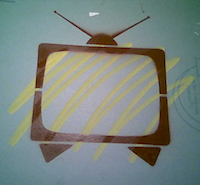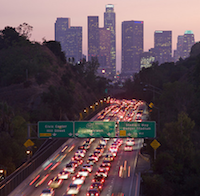 Editor’s Note: We’re wrapping up 2011 by asking some of the smartest people in journalism what the new year will bring.
Editor’s Note: We’re wrapping up 2011 by asking some of the smartest people in journalism what the new year will bring.
Next up is Rex Sorgatz (@fimoculous) — a media consultant, writer, and entrepreneur based in New York — who has an apocalyptic vision for the nation’s startup scene, and who really needs to work on his tan.
 Let’s get this out of the way: I hate LA.
Let’s get this out of the way: I hate LA.
I hate LA the way that any good New Yorker hates LA, with a passion bordering on paranoid psychosis. I hate the faux culture, I hate the vapid people, I hate the unctuous politics. I hate their smug attitude toward snow, unless it involves indie movie premieres near ski slopes. I hate the things that are too cliché to even mention hating: their tans, their cars, their smog. I hate the way they turned silicon into silicone.
So we’re clear?
But I am here to preach a new sermon: LA is the Future. It pains me to say, but it’s time we all sucked up the fresh sludge spewing from the organic juice pumper. My logic? Let me start with a story….
I moved to New York City four years ago — just in time to catch the economic collapse, but also just in time to witness the rise of the so-called “New York Tech Startup Scene.” It seems silly to recall this, but back then, that phrase — “New York Tech Startup Scene” — literally did not exist. There was no Foursquare, no GroupMe, no Kickstarter, no General Assembly, and no TechStars. HuffPo had yet to become the juggernaut it is today, and Tumblr, Buddy Media, and Gilt Groupe had yet to celebrate one-year birthdays.* There were no Google or Facebook mega-offices. Tina Brown was busy writing books about Princess Di.
 But look at you now, baby! You’re the rising star of the tech family, positioned right behind big brother Silicon Valley in creating new media enterprises. You’ve nurtured a new culture of entrepreneurialism, created thousands of jobs, and caused countless people to utter that phrase “we want to change the world” without irony.
But look at you now, baby! You’re the rising star of the tech family, positioned right behind big brother Silicon Valley in creating new media enterprises. You’ve nurtured a new culture of entrepreneurialism, created thousands of jobs, and caused countless people to utter that phrase “we want to change the world” without irony.
Yet one question lingers: Why now? After all, New York was barely a blip in the first dot-com boom of the late ’90s. So what caused the scene to suddenly erupt? No one has yet written the definitive account of why exactly NYC had this surge in entrepreneurial gusto, and we lack the space to investigate it thoroughly here, but I have my own working theory: It’s the economy, stupid. Duh.
But in this case, it was, somewhat paradoxically, an economic collapse. In the recession that began in 2008, three sectors of the New York economy were hit especially hard: finance, media, and retail. It’s no coincidence that today’s most successful NYC-based startups are unique reinventions of those industries. If you scan the startup scene now, you’ll hear endless stories about people who “used to work in finance,” “hated their job in fashion,” or “will never work for a media company again.” (Okay, maybe that last one is me.) Clearly, what happened is that talented people left their jobs, but didn’t leave their industry. Instead, they built new businesses — more efficient businesses, more interesting businesses — in the industries they knew best.
This part seems obvious.
You see where I’m going with this?
Let’s start here: Right now, I pay over $200 per month to have 1,600 TV channels pumped into my apartment. How many of those channels do I watch? A dozen, max.
 This is clearly broken. Really broken. Stupid broken.
This is clearly broken. Really broken. Stupid broken.
And we all know this has to end, somehow. And we all know it will end, somehow. But no one knows quite how. Maybe it will be fixed by Apple, maybe Hulu, maybe Netflix, maybe Google; probably, by something we haven’t even seen yet. But I think we can all agree that this broken system is going to be fixed, somehow.
And when that happens, the fallout for the LA-based television industry will be catastrophic. It will make the print media collapse of the past decade look like Legos. I predict over half of those 1,600 cable channels will disappear. Sure, they’ll try to recreate themselves on YouTube or via other online mechanisms, but that industry is already too bloated to realize that it needs to do more than shave costs by 10 percent — it needs to move an entire decimal to the left. Maybe twice.
When the collapse hits, capital will rush out of the traditional entertainment industry faster than you can say “Lehman Brothers.” And, as in New York, talented young people with industry awareness will be there to grab that capital and create new businesses. That’s when things will get interesting. Just as New York — against all odds — became the locus of traditional business being disrupted by technology, Los Angeles will erupt with creativity around the collision of technology and entertainment. New forms of content — programming that isn’t bound by 13 episodes that are 22 minutes long! — will appear overnight. The disruption will be challenging at first, but a Video Renaissance will emerge.
 And as the production and distribution costs plummet (just as they have for written media), innovation will start to appear in related industries: social sharing technology, revenue models, aggregation, and distribution. Suddenly, coders in SF will consider LA as another option for employment. Crazy talk!
And as the production and distribution costs plummet (just as they have for written media), innovation will start to appear in related industries: social sharing technology, revenue models, aggregation, and distribution. Suddenly, coders in SF will consider LA as another option for employment. Crazy talk!
This will of course require more than some happy chatter and a few blog posts. And let’s not forget, this is LA we’re talking about — there will be blunders! But failure will nurture knowledge. LA will be poised for this moment because it will have the cash, the talent, and the creative culture to seize it.
It will be fun, it will be exciting. And I might even hate LA a little less.
*Update, 1/2/12: This post originally listed The Huffington Post among the publications that had yet to celebrate one-year birthdays in 2007. In fact, HuffPo was launched in 2005. We’ve updated the wording to reflect that, and thanks to Rachel Sklar for pointing it out.
Image of New York by Houy.in; image of LA by Kevin Stanchfield; and image of a television by USB, all used under a Creative Commons license.